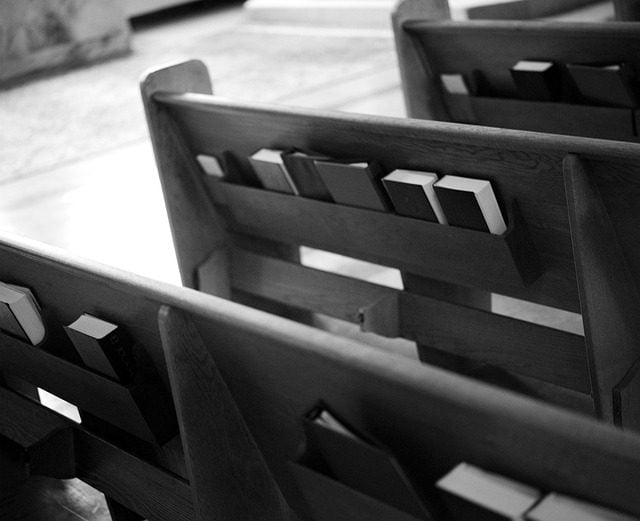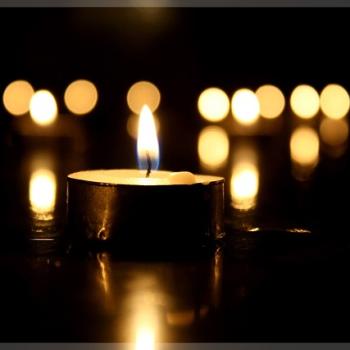
The month of June began with being told I had no dignity.
That’s probably not what Father Matthew Schneider thought he was doing, but it’s what happened. I forget who it was on Twitter that tweeted a picture of a rainbow flag and a hope that LGBTQ people like me would be treated with dignity and respect for our rights. Father Matthew quote tweeted it with a comical GIF of a sloth saying “no.” When people suggested this was in violation of the Catechism’s insistence that LGBTQ people be treated with respect and protected from unjust discrimination, he doubled down. I tried to tell him how much it hurt gay Catholics like me who are trying to obey the Church, but he didn’t care. He seemed offended that anyone would be hurt by his glibness.
This stung. I’ve liked Father Matthew’s posts before. I admire him for standing up to vaccine conspiracy theorists and for speaking openly about his autism. And here he was ridiculing the idea that I have dignity and rights. I tried to tell him so, and he pooh-poohed it, claiming all his critics missed the point. We all leaned in, explaining that his cruel response was hurtful to many people, and he responded by blocking me. I’m still blocked.
At the end of June, Father Casey Cole, another priest I liked who has said a lot of good things online, posted a Tiktok video. It was meant to be a riff on the “she’s a ten, but…” memes that are going around social media right now, rating a woman’s looks from one to ten and then adding a line that’s a deal breaker in a sexual relationship. It’s a tasteless trend, and the Tiktok was also tasteless. It showed Father Casey and another priest in sunglasses, rating women based on their physical appearance and their piety. “She’s a six, but she reads the Bible and prays every night? She’s a ten. She’s a four, but she engages in the corporal mercy every day and works for peace and justice? She’s a ten!”
The tiktok was ratioed on social media, by many people including priests, religious sisters, and me. We all tried to tell him to reconsider this. It was pointed out that it’s unseemly for a priest to rate a woman’s body even as a joke. We pointed out that the Franciscans have been in the news for all manner of abusive and disrespectful behavior toward women: Tiesi and Scanlan, Morrier, Jurchak. A lot of us are struggling severely with our faith because of these betrayals, and we don’t need to see a priest in a Franciscan cassock objectifying women even as a joke.
I introduced myself as “a four,” which is wishful thinking. I’m more of a two and always have been. I tried to tell him what it’s like to be an unattractive Catholic girl, and how harmful it is to say that piety can make a person sexy. I didn’t expect him to have thought of this already. There’s no real reason he should. He’s a young man and a vowed celibate. But I expected him to be capable of listening to reason.
Instead, he belittled his critics.
We tried again to explain why the joke was harmful.
Eventually he deleted the facebook post, but not so far the TikTok and not the post belittling us. He didn’t say he was sorry.
I was deeply disappointed.
It took awhile for me to even admit to myself why I was so disappointed. I’ve been Catholic for more than three decades. I should be used to this by now.
I finally admitted to myself that it’s because I’ve never even once heard a priest apologize. Maybe I’m just forgetting, but I can’t think of a single apology in my life.
The priest at our parish growing up, who insisted the historic old social hall needed to be completely demolished and replaced by a fancy new building, even though the parishioners disagreed and even though he was warned it would be astronomically expensive, eventually saddled the parish with seven figures of debt we couldn’t pay. And then he was transferred to Spain, and the next pastor had to busk and fundraise for that impossible amount. The offending pastor didn’t apologize. He just disappeared.
The priest who bullied and embarrassed me at the behest of my old Faith Household at Franciscan University never apologized. Once he said “it’s unfortunate that you are so wounded by this,” but he didn’t say he was sorry. He bullied and embarrassed several people I know. He had a reputation for it at Franciscan. And he didn’t apologize to anyone, ever.
The priest who didn’t understand that my daughter’s meltdowns at church were from overstimulation because she’s on the spectrum and embarrassed us for our bad parenting didn’t apologize.
And of course, the priests who have committed much more severe infractions never apologized. Even if they go to jail, they don’t apologize. Their bishops and superiors don’t apologize for them, for fear of legal liability.
We’re supposed to get on our knees in the confessional and tell God, through the priest, all that we’ve done wrong since the last time we were in there. We’re supposed to assure God, through the priest, that we’re most heartily sorry, not only because we fear punishment but because we know our deeds were wrong. If we don’t express that contrition, the priest, on behalf of God, can withhold absolution. But if a priest, acting as himself and not in persona Christi, does something wrong– by mistake or on purpose, through fear or through malice or for any reason whatsoever– he never says he’s sorry.
My non-religious readers will tell me “I told you so” and be bemused that I expected anything different, and you’re not wrong. But respectfully, it’s very different to be inside a faith tradition and see all the good there is there, and be hit over and over again by how our clergy don’t live up to that good. You don’t understand what I’m suffering right now and you couldn’t.
My Catholic readers may well chide me and say I should “pray for priests” rather than criticize them. But I’m not going to do that either. What they’re doing is harmful and I would be remiss if I didn’t speak against it.
This hurts, deeply.
I still don’t know what I’m going to do about that hurt.
That’s where I am today.
Image via pixabay
Mary Pezzulo is the author of Meditations on the Way of the Cross, The Sorrows and Joys of Mary, and Stumbling into Grace: How We Meet God in Tiny Works of Mercy.
Steel Magnificat operates almost entirely on tips. To tip the author, visit our donate page.













